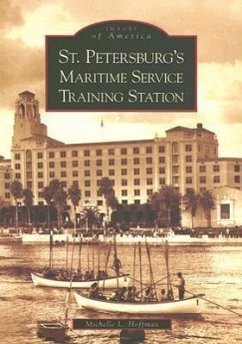During World War II, the U.S. Merchant Marines suffered the highest percentage of casualties, although it was the second smallest service. The young maritime servicemen knew these realities because they were trained to survive an enemy attack and keep their ships moving regardless of the cargo. For 25,000 merchant seamen, the journey began in St. Petersburg, Florida, selected as a training site for its comfortable climate and strong relationship with the U.S. Coast Guard. The U.S. Maritime Training Station was an economic shot in the arm that saved St. Petersburg from the extended hardships of the Great Depression's later years. Local merchants such as Bell Bakeries, the Swift and Company, and the Frazier Brothers routinely delivered bread, vegetables, and fruits to the station; as World War II reached a fever pitch, local hotels, such as the Vinoy and the Soreno, served as boarding houses for the maritime service.
Bitte wählen Sie Ihr Anliegen aus.
Rechnungen
Retourenschein anfordern
Bestellstatus
Storno

